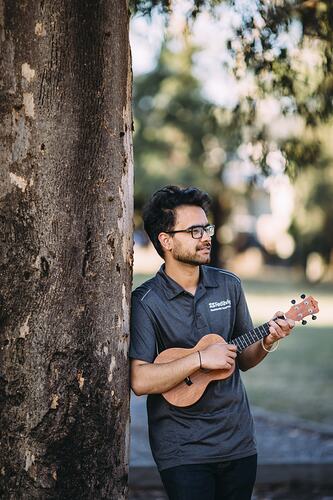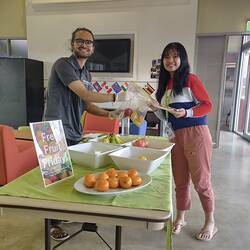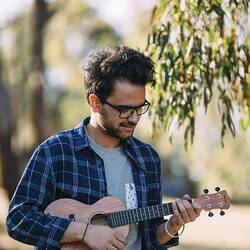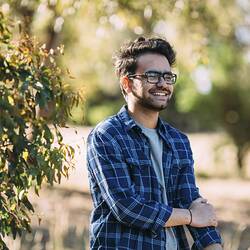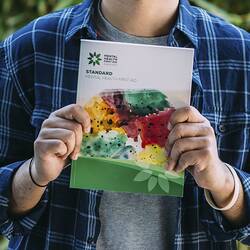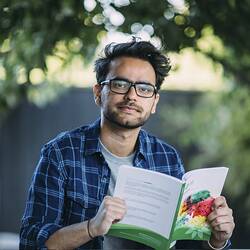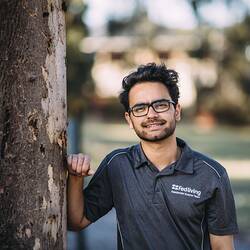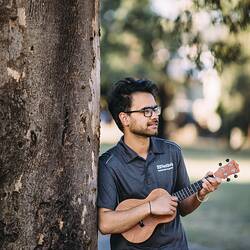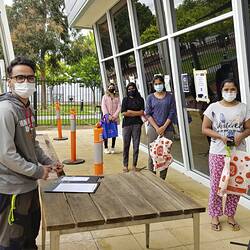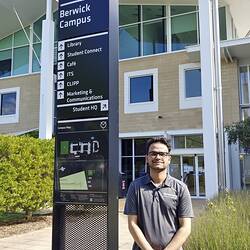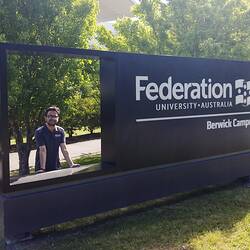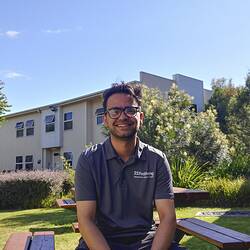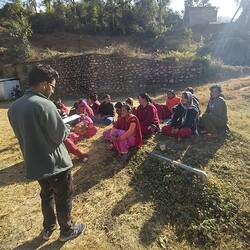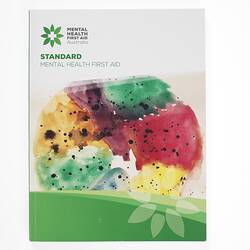Summary
Pranaya Lohani arrived in Melbourne as an international student in 2019, having survived an earthquake in his home country of Nepal in 2015. In 2020 the COVID-19 pandemic struck the world and his new life in Melbourne, changed dramatically.
Life in Nepal:Pranaya Lohani was born in Kathmandu, Nepal on 17 January, 1993. He lived with his parents Bishnu and Leela Lohani and his older brother Pratik. Bishnu had been a construction contractor until his health and then the COVID-19 pandemic impacted on his work. The Lohanis have a wide extended family with whom they are very close. Pratik left Nepal around 2018 to study in Washington DC.
In April 2015, Pranaya and his mum were about to eat lunch at home when they felt a series of earth tremors, not uncommon in Nepal so they weren't too concerned, but they began to make their way downstairs. Then the walls of their home began to shake and sway. They held onto each other in the building's stairwell with Leela chanting mantras and then, when safe, they escaped into nearby fields where terrified neighbours were beginning to gather.
Pranaya says he will never forget the people's faces, blank with shock. Pranaya and his immediate and extended family were not harmed and their homes survived, living in a modern part of Kathmandu where the building codes were strict. However, the earthquake, registering 7.8 on the richter scale, claimed the lives of nearly 9000 people and displaced hundreds of thousands.
Pranaya was studying social work at the time and leapt into volunteering, distributing relief materials to affected community members and assisting humanitarian organisations. The experience was a huge turning point for Pranaya and would go on to influence his response to the coronavirus pandemic.
'The subsequent support and camaraderie among the Nepalese really taught me a valuable lesson in life,' he says. 'The whole event and the aftermath of it pushed my helping nature to another level, encouraged me further.' [interview notes with Catherine Forge, Museums Victoria, 9 December 2020]
New Life in Melbourne:
In February 2019, having completed his social work degree, Pranaya moved to Melbourne to pursue a post graduate degree in social work at Federation University's Berwick campus. His English language skills were already proficient, assisted by a large diet of television.
'I had done my previous degree in social work back in Nepal, so this is what I wanted to do for my post-grad studies too,' he recalls. 'I had done a fair bit of research about universities all around that offered this degree but ultimately my heart settled with Australia because of its wide range of services and the huge scope that is available in this field of work.' [interview notes with Catherine Forge, Museums Victoria, 9 December 2020]
Pranaya reflects that Federation University offered generous accommodation support, making settling in a new environment and commencing courses immediately much easier. Although it took some time to adjust to the Australian education system, Pranaya immersed himself in university life and soon found himself feeling at home at Federation University's Berwick Campus. This was also assisted by a strong Nepalese student community already in Melbourne.
'Studying in a university, making friends from many parts of the world, getting opportunities to contribute, and learning the culture here [in Melbourne] has been just incredible,' he says. 'The university life is something I cherish already and it has taught me so many things about myself as an individual.' [interview notes with Catherine Forge, Museums Victoria, 9 December 2020]
COVID-19:
But the last thing Pranaya could have anticipated happening while he was studying abroad was a global pandemic. In March 2020, as COVID-19 exploded in Australia, Victoria announced a state of emergency and a subsequent lockdown. Pranaya recollects the initial shock and unreality of it all:
'The first few weeks when the virus arrived, I was thinking to myself, is this really happening? I was staying in uni accommodation and had attained the role of residential advisor (a liaison role between staff and students). I realised the severity [of the situation] when we had our first meeting with the upper hierarchy from the uni. Talks of lockdown and support to the students started to come up strongly. That hit me hard and I kind of knew we could be in for something bigger.' [interview notes with Catherine Forge, Museums Victoria, 9 December 2020]
What soon emerged in the media and university sectors more broadly was the immediate and severe impacts lockdown was having on international university students.
'Having to adjust to online learning at first was really tough for me personally as I just could not concentrate,' Pranaya recalls. '[The] majority of the international students went through a tough period. Firstly, they had to adapt to a totally new method of learning which they were not used to, and had not hoped to do.'
A major drawcard of studying abroad is being able to engage with and connect to fellow students and university staff face-to-face, and attending classes and lectures on campus is a huge part of the university experience. But while virtual learning has been a key struggle for many students, Pranaya identifies the financial pressures of COVID-19 as the dominating stress factor.
'Managing the tuition fees, rent [and] groceries was getting hard for the majority of the students as they could hardly get out and get jobs,' he says. 'This was even more so difficult for the students who had just arrived for the February intake and everything shut down within a month after their arrival. That brought out many challenges mentally as well. Being stuck within the four walls for a longer period of time and being away from your family no doubt is quite a tough thing to beat.'
A Creative Outlet:
Pranaya experienced firsthand the challenges of being housebound in cramped student accommodation, but turned to the creative arts for entertainment and stimulus.
'I knew I had to find something to do or develop a new hobby of some sort just to get my head clear and find a positive distraction,' he recalls. 'And enter - the ukulele! I started learning it and eventually managed to play a song or two. I just plucked on the strings and it made me relax and focus on positive things.'
Pranaya had wanted to learn the guitar when he was younger, but had little success. In Melbourne he met Anush Poudel, a younger, fellow student from Nepal who was studying Information Technology at Federation University. Anush had brought in his suitcase a ukulele from Nepal which he played but he decided to take up the guitar and offered Pranaya his ukulele as a gift. Pranaya describes the ukulele as being 'like a friend to me' during those dark days of lockdown and isolation in 2020. Learning to play acted as a form of therapy for him and he continues to play and teach himself songs.
A Volunteer Community:
As well as music, what ultimately helped Pranaya through the uncertainties and anxieties of the pandemic was getting out into the community and helping others.
'I guess I just started keeping myself busy and helping out in the student pantry at the uni,' he says. 'Attending meetings, acting as a liaison between the students and the staff, and encouraging students to participate in online events to uplift the mood.'
Pop-up grocery stores throughout Victoria, which offered fresh produce and food staples free of charge, provided crucial relief for the international student community. Pranaya's volunteer work at his own university's foodbank proved both rewarding and motivating and reflected his upbringing in Nepal.
'It is just a part of me and who I am, really, wanting to help out and create a close bond with the people I am living together with,' he says. 'I was brought up with values that put family and togetherness first, respecting everyone around you and helping with whatever you can. So, having been brought up with those values from an early age, I just wanted to be a part of it and lend a hand.'
Along with food banks, additional support services were set up for many student communities that Pranaya says were a considerable help. 'The support from the universities, various support agencies and organisations, the way they organised and collaborated to help the international students was truly fantastic,' he attests. 'A unity could be seen, and the support-givers empathised with what the students were going through. It was really great to see everyone coming together for a great cause.'
Kathy Racunica, head of Federation University's Berwick Campus, attributes this success to an International Student Hardship Fund that was created specifically to assist international students in need throughout COVID-19. 'We raised significant funds through staff donations,' she explains. 'I believe a number of Universities in Victoria (and Australia) established similar funding.'
It was this solidarity and mutual support between students, relief organisations and Federation University staff that Pranaya maintains was a saving grace for him and fellow international students: 'The support [.] was fantastic to see during the pandemic, which I really hope [will] continue in difficult times in the future. I would love to see more universities follow suit with what some of the universities, including Federation, did to help international students.' [interview notes with Catherine Forge, Museums Victoria, 9 December 2020]
Pranaya received support from many people over his time at the university, but in particular Liz Myers (co-ordinator of the commercial services of Fedliving) and Jason Walden (International Student Officer) at the university's Berwick campus. Liz has been involved in looking after the residents needs and managing the events since the inception of the student accommodation in Berwick campus, and encouraged Pranaya to apply for the Residential Advisor role; and Jason has been providing international student support through activities and programs (including the establishment and management of the student pantry) and overseeing their welfare and smooth transition to Australian university life.
Pranaya reflects that both people offered him constant encouragement and motivation to do well. As witnessed in the aftermath of Nepal's 2015 earthquake, Pranaya emphasises the fundamental role community spirit and comradeship plays to see people through times of hardship and suffering. 'I think experiences also teach you along the way,' he reflects. 'I've learnt that times change and it's never always dark. It is really easy to get lost and be hopeless but you have to instil in your mind that the good times will definitely come, [and] remind yourself that you are never really alone.' [interview notes with Catherine Forge, Museums Victoria, 9 December 2020]
International Student Community:
Not only did Pranaya's COVID-19 relief work prove a useful distraction from lockdown and the virus, it also enriched his university life and connected him to others. 'I loved every moment of it,' he says. 'I got to make new friends, it helped me explore more about myself and identify my capabilities. The most important thing [.] was the constant interaction with the people, just talking about ordinary stuff or sometimes heavy issues like life and the situation and hearing their views about various things made me feel really good.
Sharing experiences with them and learning about what they believe in, what their interests are, was great.' [interview notes with Catherine Forge, Museums Victoria, 9 December 2020]The international student community in Melbourne, with its diversity and magnitude, represents an important part of the city's cultural identity. As Federation University's Kathy Racunica acknowledges, 'We have hundreds of thousands of international students in Victoria and their contribution on many fronts is significant and extraordinarily positive year in year out. Reflecting their experience during COVID is very important.'
The Future:
Pranaya completes his degree in mid-2021 and will apply for a two-year visa extension, and he is open to interstate employment opportunities. After that, he says, he will wait and see. Pranaya hopes for a trip home one day to Nepal to see his parents whom he misses enormously and speaks to regularly online. Their advice to him has been not to hurry home and to take advantage of the greater opportunities in Australia. Pranaya's story is one of ongoing resilience and optimism in the face of hardship, and of the power of community and kinship. Story developed with the support of the Victorian Government Office of Suburban Development.
More Information
-
Keywords
-
Authors
-
Article types
